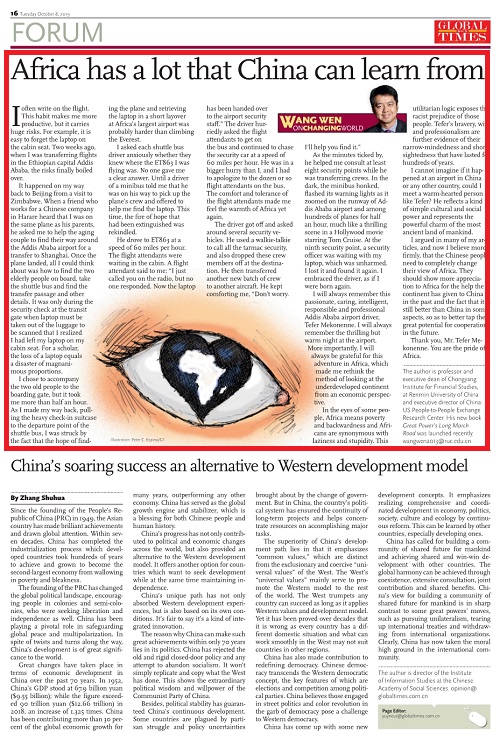Commentaries
Your Present Location: Teacher_Home> Wang Wen> CommentariesWang Wen: Africa has a lot that China can learn from
By Wang Wen Source: Global Times Published: 2019-10-7

I often write on the flight. This habit makes me more productive, but it carries huge risks. For example, it is easy to forget the laptop on the cabin seat. Two weeks ago, when I was transferring flights in the Ethiopian capital Addis Ababa, the risks finally boiled over.
It happened on my way back to Beijing from a visit to Zimbabwe. When a friend who works for a Chinese company in Harare heard that I was on the same plane as his parents, he asked me to help the aging couple to find their way around the Addis Ababa airport for a transfer to Shanghai. Once the plane landed, all I could think about was how to find the two elderly people on board, take the shuttle bus and find the transfer passage and other details. It was only during the security check at the transit gate when laptop must be taken out of the luggage to be scanned that I realized I had left my laptop on my cabin seat. For a scholar, the loss of a laptop equals a disaster of magnanimous proportions.
I chose to accompany the two old people to the boarding gate, but it took me more than half an hour. As I made my way back, pulling the heavy check-in suitcase to the departure point of the shuttle bus, I was struck by the fact that the hope of finding the plane and retrieving the laptop in a short layover at Africa's largest airport was probably harder than climbing the Everest.

I asked each shuttle bus driver anxiously whether they knew where the ET863 I was flying was. No one gave me a clear answer. Until a driver of a minibus told me that he was on his way to pick up the plane's crew and offered to help me find the laptop. This time, the fire of hope that had been extinguished was rekindled.
He drove to ET863 at a speed of 60 miles per hour. The flight attendants were waiting in the cabin. A flight attendant said to me: "I just called you on the radio, but no one responded. Now the laptop has been handed over to the airport security staff." The driver hurriedly asked the flight attendants to get on the bus and continued to chase the security car at a speed of 60 miles per hour. He was in a bigger hurry than I, and I had to apologize to the dozen or so flight attendants on the bus. The comfort and tolerance of the flight attendants made me feel the warmth of Africa yet again.
The driver got off and asked around several security vehicles. He used a walkie-talkie to call all the tarmac security, and also dropped these crew members off at the destination. He then transferred another new batch of crew to another aircraft. He kept comforting me, "Don't worry. I'll help you find it."
As the minutes ticked by, he helped me consult at least eight security points while he was transferring crews. In the dark, the minibus honked, flashed its warning lights as it zoomed on the runway of Addis Ababa airport and among hundreds of planes for half an hour, much like a thrilling scene in a Hollywood movie starring Tom Cruise. At the ninth security point, a security officer was waiting with my laptop, which was unharmed. I lost it and found it again. I embraced the driver, as if I were born again.
I will always remember this passionate, caring, intelligent, responsible and professional Addis Ababa airport driver, Tefer Mekonenne. I will always remember the thrilling but warm night at the airport. More importantly, I will always be grateful for this adventure in Africa, which made me rethink the method of looking at the underdeveloped continent from an economic perspective.
In the eyes of some people, Africa means poverty and backwardness and Africans are synonymous with laziness and stupidity. This utilitarian logic exposes the racist prejudice of those people. Tefer's bravery, wit and professionalism are further evidence of their narrow-mindedness and short-sightedness that have lasted for hundreds of years.
I cannot imagine if it happened at an airport in China or any other country, could I meet a warm-hearted person like Tefer? He reflects a kind of simple cultural and social power and represents the powerful charm of the most ancient land of mankind.
I argued in many of my articles, and now I believe more firmly, that the Chinese people need to completely change their view of Africa. They should show more appreciation to Africa for the help the continent has given to China in the past and the fact that it is still better than China in some aspects, so as to better tap the great potential for cooperation in the future.
Thank you, Mr. Tefer Mekonenne. You are the pride of Africa.
The author is professor and executive dean of Chongyang Institute for Financial Studies, at Renmin University of China and executive director of China-US People-to-People Exchange Research Center. His new book Great Power's Long March Road was launched recently.
























































































 京公网安备 11010802037854号
京公网安备 11010802037854号





